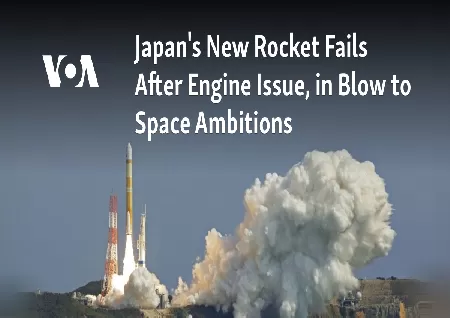Japan's new rocket fails after engine issue, in blow to space ambitions

A setback to Japan's aspirations to lower the cost of reaching space and compete with Elon Musk's SpaceX, a new medium-lift rocket from that country failed on its first trip into orbit on Tuesday when the launcher's second-stage engine did not ignite as anticipated. According to a live webcast by the Japan Aerospace Exploration Agency, the 57-meter (187-foot) tall H3 rocket launched without a hitch from the Tanegashima space port (JAXA). (JAXA). A launch broadcast commentator from JAXA said, "It was determined the rocket could not accomplish its objective, thus the destruct command was delivered. "Well, what took place? Looking at all the data, it's something we need to look into. The unsuccessful effort came after a launch that was cancelled last month. This time, unlike the other postponements and cancellations, it was a total disaster, according to Hirotaka Watanabe, an Osaka University professor with experience in space affairs. The future space policy, space business, and technical competitiveness of Japan will all be significantly impacted by this, he continued.
The ALOS-3, a disaster management and land observation satellite that was also outfitted with an experimental infrared sensor meant to monitor North Korean ballistic missile launches, was being carried by Japan's first new rocket in three decades. Mitsubishi Heavy Industries Ltd. (MHI), the company that built the H3, said it was checking the circumstances surrounding the rocket with JAXA and did not immediately have any comments. The H3 is expected to cost half as much to launch as its predecessor, the H-II, according to MHI, allowing it compete in a worldwide launch market that is increasingly dominated by SpaceX's reusable Falcon 9 rocket. A firm representative previously stated that the corporation was counting on the dependability of Japan's past rockets to attract customers. The cost of a Falcon 9 launch to low Earth orbit was estimated by the Center for Strategic and International Studies to be $2,600 per kilogramme in a research released in September. The H-II has a similar price tag of $10,500.
A successful launch on Tuesday would have put the Japanese rocket into orbit before the launch of the new, less expensive Ariane 6 spacecraft by the European Space Agency later this year. The H3 is intended to launch government and commercial satellites into Earth orbit and will deliver supplies to the International Space Station. It is powered by a new, more affordable engine that uses 3D-printed components. It will ultimately transport supplies to the Gateway lunar space station that the American space agency NASA aims to build as part of its mission to return people to the moon, including Japanese astronauts, as part of Japan's expanding collaboration with the United States in space. In early trade, MHI shares decreased 1.8%, while the larger Japanese benchmark index increased.
Related queries to this article
- Elon Musk
- SpaceX
- Japan Aerospace Exploration Agency
- Tanegashima space port
- Japan
- NASA
- United States
Read more articles and stories on InstaSity Latest News.





